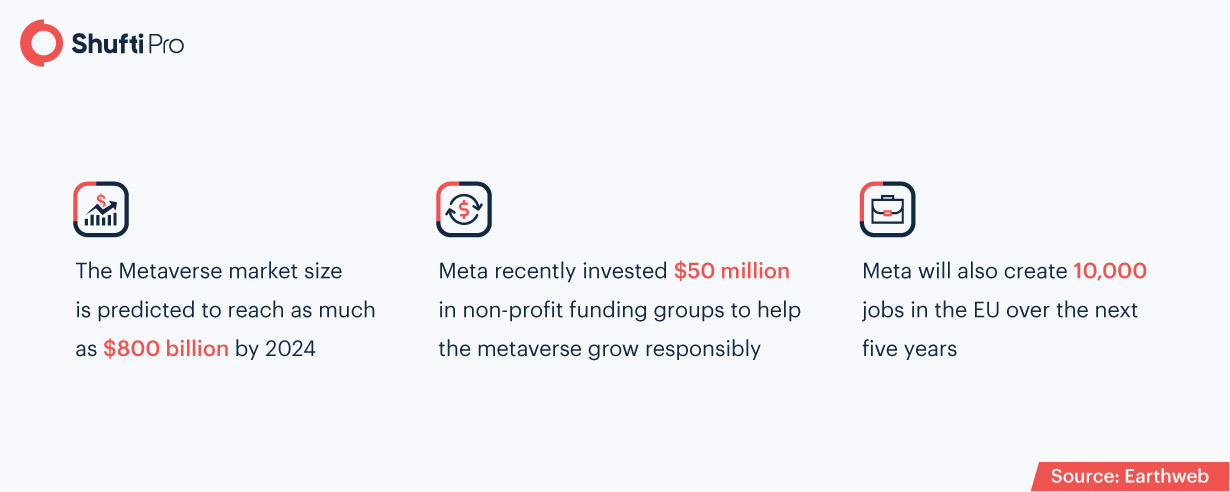Metaverse and Money Laundering – How Shufti’s AML Screening Helps

For quite some time now, the world has been preparing itself for the latest development in multipurpose social platforms. The metaverse is a world-changing technology that changes the very concept behind social platforms with the use of Web3.0. What makes Web3.0 different is a decentralized, permissionless, and trustless system that is a token-based economy on blockchain.
Apart from providing new opportunities for work, social connections, and online shopping, the metaverse also allows criminals to take advantage of digital wallets to obscure the origins of their illegally obtained funds.
In this blog, we dive into the details of what makes the metaverse vulnerable to financial crime.
The Metaverse – A New Concept?
Despite the common assumption, the metaverse is not really a completely new concept. Online games like the Sims and Second life are an example of technologies that are amplified to create the metaverse. In the metaverse, activities are based on the same concept as in the real world – everything is dependent on money. The only difference being the metaverse is virtual rather than real, everything from interacting with others, sending and receiving services, or buying and selling a property requires money in the form of cryptocurrency payments.
Moreover, the metaverse also promises huge potential for partnerships between payment service providers and companies that have the requirement of dealing in virtual assets. Cryptocurrency trends and other related concepts like NFTs are constantly going through different ups and downs based on popularity and how the media portrays them. The end of 2021 saw a period where the crypto sector was soaring sky-high, but there are always risks of financial crime when any industry begins making big money. According to industry experts, the metaverse is not much different when compared to ongoing investment fraud and previous trends like Ponzi schemes.
Ultimately, the metaverse is going to issue more and more tokens as its popularity rises, and there will be a subsequent increase in financial crime through the decentralized system. Experts also suggest that financial crime will inevitably prevail in the metaverse as the lack of links to the wider paradigm of the crypto landscape including the smaller projects before the introduction of the metaverse.

Financial Crime Risks in the Metaverse
However, along with all the new opportunities, the metaverse has some factors that invite criminals to take advantage of the system for their own illegal gains. Identity theft, data hacks, breaches, and other financial scams are all possible in the metaverse as they are driven by the similar purpose of stealing someone’s personal information and accessing their digital wallets for illicit activities. Big money can be moved here and there using the metaverse due to the decentralized blockchain-based structure that links every task to digital wallets.
As of now, there is no definitive idea of financial crime regulations that are applicable to the metaverse. However, the lack of Know Your Customer (KYC) verification means that users are generally less protected in the digital landscape. Inadequacy in terms of consensus and unified rules that apply to the metaverse can become the reason that motivates criminals to pursue their illegal activities.
Since the internet is generally not bound by any single central authority or regulatory body, the metaverse is also currently assumed to follow a similar framework. When it comes to the protection of digital assets, Web3.0 seems to take businesses back to the times of the World Wide Web, allowing users to perform activities freely without the requirement to go through intermediaries or a central body.
Regulations for KYC in the Metaverse
Clearly, the main culprit for making the metaverse vulnerable to money laundering is its decentralization. The metaverse is said to be a product of capitalism that has a structure acting as a barrier to security for its users. As a result, there is no centralized landscape or a clear picture about what or who is ultimately responsible for regulations and enforcement. All this collectively creates a scenario where there is a desire to avoid the costs and implications that come with ensuring regulation while establishing a safe, crime-free digital environment.
The metaverse is expected to be a digital representation of the real world as we know it today. Various countries around the world have already started working alongside the FATF and their respective governments to implement robust KYC verification and AML screening measures to prevent financial crime. Just like individuals that defraud and steal others’ money in the real world, users in the metaverse will also come up with new techniques to do the same. It’s quite obvious that the global financial system needs more than just a simple verification system.
How to Combat Money Laundering in the Metaverse
The way to combat financial crimes like money laundering in the metaverse may not be straightforward considering the number of possibilities and risks. It is important for businesses to hold discussions with industry experts and subject matter experts to achieve the balance between regulatory developments in the metaverse and the world of virtual assets. Companies must understand that they need to prioritize a robust AML screening approach to stand strong against money laundering threats.
Gou Wenjun, head of anti-money laundering of the People’s Bank of China (PBoC), said that the apex bank would regulate the non-fungible token (NFT) and metaverse sectors. These are the major upcoming areas in the cryptocurrency and blockchain space that China hopes to regulate while creating new opportunities.
What Shufti Offers
With financial criminals exploiting the metaverse, upcoming businesses are feeling the need to enhance their measures for combating money laundering and terrorist financing. Like other businesses, metaverse companies are also based on customer trust and loyalty. However, conventional ways of securing business interests are considered inadequate when it comes to fighting today’s sophisticated criminals that use the latest tech-driven tools to achieve their motives.
Preventing financial crimes and the digital assets of customers in the metaverse is only possible through AI-driven AML solutions.
Shufti’s AI-driven AML Screening is an ideal solution for metaverse companies as they can accurately determine the background information of customers and categorize them according to risk level. Our AML screening solution verifies customers against 1700+ global watchlists with 98.67% in less than a second.
Want to know more about AML Screening services for the metaverse?

 Explore Now
Explore Now













